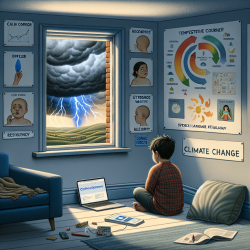Introduction
As practitioners dedicated to improving children's outcomes, understanding the multifaceted impact of extreme weather events (EWEs) on child mood and behavior is crucial. The research article titled "Effects of Extreme Weather Events on Child Mood and Behavior" provides a comprehensive analysis of how these events affect children's mental health. By integrating these findings into practice, professionals can enhance their therapeutic approaches and contribute to better mental health outcomes for children.
Key Findings from the Research
The study highlights several critical points:
- EWEs, exacerbated by climate change, significantly impact children's mood and behavior.
- Posttraumatic stress (PTS) is the most prevalent mental health consequence among child survivors of EWEs.
- PTS often coexists with depression and anxiety, creating a complex clinical picture.
- While some children exhibit resilience and transient symptoms, others experience long-term psychological effects.
Implications for Practitioners
Practitioners can leverage these findings to enhance their therapeutic strategies:
- Early Identification and Intervention: Implement screening tools to identify children at risk of PTS and related conditions following EWEs. Early intervention can mitigate long-term effects.
- Holistic Approaches: Consider the comorbidity of PTS with depression and anxiety. Tailor interventions to address the full spectrum of symptoms.
- Promoting Resilience: Encourage resilience-building activities and coping strategies. Support systems, including family and community, play a crucial role in fostering resilience.
- Continued Education: Stay informed about the latest research on climate change and its psychological impacts. Engage in professional development opportunities to enhance your skills in this area.
Encouraging Further Research
While the current study provides valuable insights, further research is necessary to deepen our understanding of EWEs' impact on children. Practitioners are encouraged to contribute to this growing field by conducting studies or collaborating with researchers. Areas for future exploration include:
- The role of specific protective factors in mitigating the psychological impact of EWEs.
- Longitudinal studies to track the progression of symptoms over time.
- Comparative studies across different types of EWEs to identify unique psychological effects.
Conclusion
Understanding the effects of extreme weather events on child mood and behavior is essential for practitioners aiming to provide effective support. By integrating research findings into practice and engaging in further research, we can enhance our ability to support children in navigating the challenges posed by climate change. For more detailed insights, practitioners are encouraged to explore the original research paper: Effects of extreme weather events on child mood and behavior.










